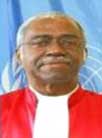Participation in an international event provides students with an opportunity to interact with students and professionals from different legal systems. It is also an opportunity to analyse a particular issue from a different perspective through exchange of ideas
The Youngest Indian to Intern at the International Court of Justice (ICJ) is Somesh Dutta of Dehradun.
The application procedure is very straight forward. The ICJ website provides for the online application form. After the submission of online application, one has to wait for at least 3-4 months, may be even longer, depending on the circumstances.
If you don't receive any response from the Court within 8 months of your application, it is considered rejected. E-mails and phone calls are usually not appreciated because of the large volume of applications they receive.
In furtherance of the policy of United Nations, no financial or logistics support is offered to the interns. After the selection, all the arrangements with regard to stay and travel are to be made by the interns themselves.
Origin of ICJ The International Court of Justice (ICJ) is the Principal Judicial Organ of the United Nations (UN). Its seat is at the Peace Palace in The Hague (Netherlands). The idea for the creation of an International Court to Arbitrate International Disputes first arose during the various conferences that produced the Hague Conventions in the late 19th and early 20th centuries. The body subsequently established, the Permanent Court of Arbitration, which was the precursor of the Permanent Court of International Justice (PCIJ), which was established by the League of Nations. ICJ was established in June 1945 by the Charter of the United Nations and began work in April 1946. All members of the UN are parties to the statute of the ICJ, and non-members may also become parties.
The Court has a dual role:
The Court decides in accordance with international treaties and conventions in force, international custom, the general principles of law and as subsidiary means, judicial decisions and the teachings of the most highly qualified publicists.
The procedure followed by the Court in contentious cases is defined in its Statute, and in the Rules of Court adopted under the Statute. The Rules date from 1978 and certain provisions have since been amended (the latest amendment entered into force on 29 September 2005). The proceedings include a written phase, in which the parties file and exchange pleadings, and an oral phase consisting of public hearings at which agents and counsels address the Court. As the Court has two official languages (English and French) everything written or said in one language is translated into the other.
After the oral proceedings the Court deliberates in camera and then delivers its judgment at a public sitting. The judgment is final and without appeal. Should one of the States involved fail to comply with it, the other party may have recourse to the Security Council of the United Nations. The Court discharges its duties as a full court but, at the request of the parties, it may also establish ad hoc chambers to deal with particular cases. A Chamber of Summary Procedure is further elected every year by the Court in accordance with its Statute.
Since 1946 the Court has delivered 117 Judgments on disputes concerning inter alia land frontiers, maritime boundaries, territorial sovereignty, the non-use of force, violation of international humanitarian law, non-interference in the internal affairs of States, diplomatic relations, hostage-taking, the right of asylum, nationality, guardianship, rights of passage and economic rights.
The ICJ is composed of fifteen judges elected to nine-year terms by the UN General Assembly and the UN Security Council from a list of persons nominated by the national groups in the Permanent Court of Arbitration. The election process is set out in Articles 4-19 of the ICJ statute. Elections are staggered with five judges elected every three years, in order to ensure continuity within the court. No two members may be nationals of the same country. There is an informal understanding that the seats of the Court will be distributed so that there are: five seats for Western countries, three for African states (including one judge of francophonic civil law, one of anglophonic common law and one Arab), two for Eastern European states, three for Asian states and two for Latin American and Caribbean states. The five permanent members of the United Nations Security Council (France, Russia, China, the United Kingdom, and the United States) always have a judge on the Court, thereby occupying three of the Western seats, one of the Asian seats and one of the Eastern European seats.
A judge can be dismissed only by a unanimous vote of other members of the Court. ,
Judges may deliver joint judgments or give their own separate opinions. Decisions and Advisory Opinions are by majority and, in the event of an equal division, the President's vote becomes decisive. Judges may also deliver separate dissenting opinions. Its official languages are English & French.
The President and the Vice-President are elected by the Members of the Court every three years by secret ballot. An absolute majority is required and there are no conditions with regard to nationality. The President and the Vice-President may be re-elected.
The President presides at all meetings of the Court. he/she directs its work and supervises its administration, with the assistance of a Budgetary and Administrative Committee and of various other committees, all composed of Members of the Court. During judicial deliberations, the President has a casting vote in the event of votes being equally divided.
In The Hague, where he/she is obliged to reside, the President of the Court takes precedence over the doyen of the diplomatic corps.
The Vice-President replaces the President in his/her absence, in the event of his/her inability to exercise his/her duties, or in the event of a vacancy in the presidency. In the absence of the Vice-President, this role devolves upon the senior judge.
As of 9 February 2015, the composition of the Court is as follows:
 |
Name | Ronny Abraham |
| Country | France | |
| Position | President | |
| Term | 2005-2018 |
 |
Name | Abdulqawi Ahmed Yusuf |
| Country | Somalia | |
| Position | Member | |
| Term | 2019-2018 |
 |
Name | Hisashi |
| Country | Japan | |
| Position | Member | |
| Term | 2003-2021 |
 |
Name | peter Tomka |
| Country | Slovakia | |
| Position | Member | |
| Term | 2003-2021 |
 |
Name | Mohamed Bennouna |
| Country | Morocco | |
| Position | Member | |
| Term | 2006-2024 |
 |
Name | Antonio Augusto Cancado Trindade |
| Country | Brazil | |
| Position | Member | |
| Term | 2009-2018 |
 |
Name | Sir Christopher Greenwood |
| Country | United Kingdom | |
| Position | Member | |
| Term | 2009-2018 |
 |
Name | Xue Hanqin |
| Country | China | |
| Position | Member | |
| Term | 2010-2021 |
 |
Name | Joan E. Donoghue |
| Country | United States | |
| Position | Member | |
| Term | 2010-2024 |
 |
Name | Giorgio Gaja |
| Country | Italy | |
| Position | Member | |
| Term | 2012-2021 |
 |
Name | Julia Subutinde |
| Country | Uganda | |
| Position | Member | |
| Term | 2012-2021 |
 |
Name | Dalveer Bhandari |
| Country | India | |
| Position | Member | |
| Term | 2012-2018 |
 |
Name | James Crawford |
| Country | Australia | |
| Position | Member | |
| Term | 2015-2024 |
 |
Name | Kirill Gevorgian |
| Country | Russia | |
| Position | Member | |
| Term | 2015-2024 |
 |
Name | Patrick Lipton Robinson |
| Country | Jamaico | |
| Position | Member | |
| Term | 2015-2024 |
After more than two decades, an Indian, Justice Dalveer Bhandari, senior judge in the Supreme Court of India, was elected with overwhelming majority to the International Court of Justice in New York.
Member states voted overwhelmingly to elect Justice Bhandari to the ICJ. In simultaneous elections held at United Nations headquarters in New York Justice Bhandari obtained 122 votes in the General Assembly and an absolute majority in the Security Council, obtaining 13 out of 15 votes.
An eminent legal luminary, Justice Bhandari has been on the Supreme Court of India since 2005 and has served in the higher Indian judiciary for over two decades. Prior to that, he had a distinguished and successful career as an attorney at law for 23 years.
He is also a member of leading international academic and legal bodies and is closely associated with a large number of committees dealing with various aspects of international law such as: Human Rights, Biotechnology, Sustainable Development, Securities Regulation, Trade, Nuclear weapons, Non-Proliferation and Contemporary International Law and Space.
Acknowledging his outstanding contribution, the Northwestern University School of Law, Chicago, while celebrating its 150 Years (1859-2009) had selected Justice Bhandari as one of its 16 most illustrious and distinguished alumni.